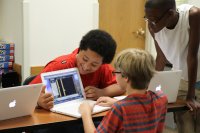The GlassLab: A New GBL Initiative
Your content has been saved!
Go to My Saved Content.Earlier this summer, the Institute of Play (famous for work in gamification of education and the Quest to Learn school model), announced the launch of GlassLab (Games Learning and Assessment Lab). With support from a variety of leaders in education and technology, this nonprofit focuses on many aspects of games and learning.
Being an avid advocate of game-based learning (GBL) and games for learning, I was particularly interested in how this might impact larger education reform, so I talked with GlassLab manager Michael John (MJ) about the project.
Games
GlassLab will be creating educational games for the classroom. These games, often called serious games, balance the learning of content with engaging gameplay. MJ told me that these games will be field-tested for a long time, and we most likely will not be seeing them for a while.
Games can provide a lot of data, and GlassLab hopes to refine and create these games with careful intention. As MJ put it, “We view teachers as the audience for our work in the same way as we view the students—if the game isn’t useful to the teacher, then our work isn’t done.”
It’s exciting to see that teachers will be part of the process in developing these learning tools. GlassLab games will be created through collaboration by teachers, experts, and game designers from Electronic Arts.
Research
As a crucial part of the design process, the GlassLab team will be focusing much of their effort in the area of research. By tracking student achievement on the Common Core, collecting in-game data, and much more, GlassLab seeks to provide credible evidence on the use of games for learning with the specific intention of proving these three hypotheses:
- Digital games with a strong simulation component may be effective learning environments.
- Game-based formative assessments may be well suited to detecting learning gains and offer ethical assessment environments, insofar as they capture learning in the environment where it occurs.
- Game-based assessments may yield valid and reliable assessment measures. In order for games for learning to be leveraged more in educational settings, research by GlassLab and other organizations will be needed.
Common Core
MJ told me that the GlassLab games will be targeting standards, specifically the Common Core, and that they will be designed for use in the classroom. As games are natural tools for assessment, it will be interesting to see what specifics are not only learned through gameplay, but also assessed that way.
Being very familiar with the Common Core, I can attest that the standards lend themselves well to game design. In the past, I’ve seen many games for learning targeted to low-level Bloom’s thinking—they offer nothing more than simple drill and kill. The Common Core standards ask for more that that; terms like “analyze,” “real world,” “create,” and “higher order thinking skills” are the focus of learning. Let’s hope that by aligning to the Common Core, the games will be targeting higher order application and thinking around the content of the Common Core.
21st Century Skills
In the press release, it seems that content knowledge alone is not enough for these games. “GlassLab reflects a major shift in the way students learn and acquire knowledge. Students today are expected to learn new skills, such as creative problem-solving, collaboration, and systems thinking, and master new technologies. GlassLab will address these new challenges by exploring how digital games can be effective environments for learning.” GlassLab will be creating games that focus not just on knowledge acquisition, but on the 21st century skills that are associated with them. GBL can be used to create situated learning where problem-solving and collaboration can occur.
I believe that GlassLab and other related organizations have the potential to help push along the conversation of education reform, although MJ did not call this one of their goals. “We’re not really thinking in terms of systems reform at the moment—that is perhaps too ambitious. We’re thinking in terms of creating some really cool, really effective learning games that excite us and that both teachers and students find engaging and valuable,” MJ said.
Ironically, however, they will be creating educational tools that may cause experts to reflect and think about how we learn, and what these learning environments could look like. Through a grassroots effort by GlassLab and other related organizations, games for learning will continue to gain clout not only as effective tools for learning, but also as a critical learning model in education reform.
